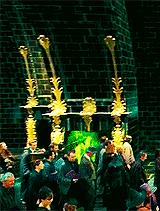Thank you for reading my blog! Please share this so more people can learn the truth about Fudge, the Ministry of Magic, and bureaucracy! Also visit my website for more info!!
Bureaucracy in the Ministry of Magic
Saturday, December 14, 2013
Friday, December 13, 2013
The reason why he used his power so corruptly was to cover up his own incompetence so that he could keep his reputation. He knew he had no idea how to handle Voldemort's return and if he agreed that he was alive he would have to come up with a solution for that problem. And he knew that since he had no solution that the public would turn on him even more and move onto the next guy who might have a solution. The beautiful irony in all of this is Fudge was fired pretty quickly after this.
The worst examples of corruption came from the Voldemort fiasco where he refused to acknowledge his return. He then set out on a mission to destroy their reputations using any means possible. He changed two laws. One in order to get Harry a trial so he could personally prosecute him, and the next was he changed a law so that he was allowed to put Dolores Umbridge as the Defense Against the Dark Arts in Hogwarts with room for a promotion by Fudge



There are a lot of examples of Fudge being corrupt throughout the book. He is incompetent and had their been an election and campaign then I think the people would have seen his poor leadership qualities and he wouldn't have won. Instead though, they have a bureaucracy where he was appointed despite his very poor leadership qualities. There are very many instances where he uses his power for corruption though to cover up his incompetence
Wednesday, December 11, 2013
With that last quote I left for you all I think you should definitely be able to see that while a little bureaucracy in government can be effective, a correct balance is needed with the elected officials making up the most significant part of the leadership positions in order to achieve an efficient government! Stephenson explains that it all starts with the leader and how he or she reacts to the majority preferences. And as evidenced many times in the book, when Fudge makes decisions he basically never has the majority of his public in mind, but merely himself only!
So my last blog ended on an example of bureaucracy actually being successful. The Beards argue that since the bureaucracy is working so successfully on a small scale level in supplying everybody in cities with clean water, then it could work on a large scale level! I just don't think that is true at all! Matthew Stephenson even talks about how a correct balance between bureaucracy and an elected government is needed in his article Optimal Control of Bureaucracy. He discusses how the level of bureaucracy depends on the amount of majority preferences the elected leader upholds.
Now don't get me wrong, bureaucracy isn't all bad! There are many examples of a bureaucratic system being successfully used. However it shouldn't be the primary structure of the government, but merely a small faction used to get a small job done quickly. An ideal way to go would be to have the elected people at the top of the leadership positions and then allow each one of them to staff their own bureaucracy to do their day to day chores and duties
Subscribe to:
Comments (Atom)



